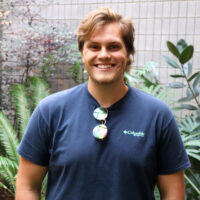
Does Landscape Context Alter Selection on Plant Defensive Strategies?
Plants have evolved a variety of physical and chemical defenses to protect themselves from insect herbivory. Due to limited resources, plants face a trade-off between what defense strategy to invest in to maximize their fitness. The pressures faced by plants vary depending on many factors, one of which being the herbivorous insects present in the surrounding environment. Natural landscapes and highly modified agricultural landscapes are associated with distinct insect communities. Here, we test for evidence of a tradeoff between physical and chemical defenses in the wild Brassicaceae species Barbarea vulgaris and whether different defensive strategies are under selection in complex versus simple landscapes. Using plants grown in both landscape types, we evaluated physical defenses by testing tissue toughness and chemical defenses using high-pressure liquid chromatography to measure levels of glucosinolates and saponins. Finally, overall fitness was determined by collecting and measuring the total seed set for each plant. Of the six chemicals tested, we found one that positively correlated with leaf toughness in both simple and complex landscapes. In addition, we found that plants grown in complex landscapes consistently had higher levels of physical defenses than those from simple landscapes. When looking at fitness, plants grown in simplified landscapes had higher fitness overall than those grown in complex landscapes. More research is required to test how landscape context affects different plants in similar landscapes. The results of this work suggest that human mediated landscape modification has evolutionary consequences for wild plant communities.
During this Research Experience for Undergraduates (REU) at Boyce Thompson Institute (BTI) I was given the opportunity to experience what it is like to be a full-time scientific researcher. In the Poveda lab, I expanded upon my prior research experience and learned new lab techniques that I would not have been able to experience at my home institution in Florida. I gained experience using a high-pressure liquid chromatograph, penetrometer, and proper lab techniques. This research experience also allowed me to work alongside graduate students. By working alongside my mentor, I had the opportunity to experience what graduate school may be like for me when it is time to attend. My mentor, PI, and other members of the Poveda lab offered me assistance not only with my research but also with future career paths and life advice. Without this BTI REU I would not have gotten these same opportunities.
